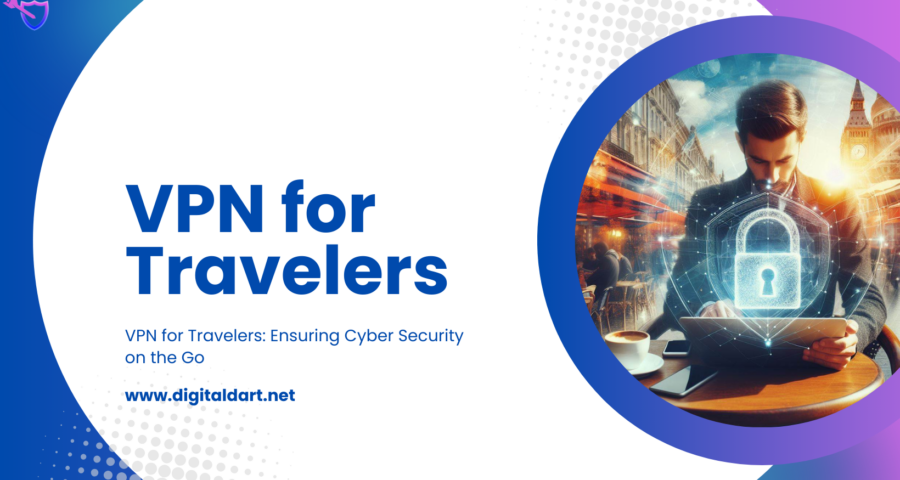Introduction:
In an era where digital connectivity is paramount, the need for cybersecurity while traveling has become more critical than ever. Hackers often target unsuspecting travelers, taking advantage of vulnerabilities in public Wi-Fi networks. To safeguard your online presence, a Virtual Private Network (VPN) is an indispensable tool. In this comprehensive guide, we’ll delve into the intricacies of VPN for travelers, exploring why they are essential, how they work, and the key features to consider.
Why Travelers Need VPNs:
Increased Risk on Public Wi-Fi:
Public Wi-Fi networks, common in hotels, airports, and cafes, pose a significant threat to your cybersecurity. Without proper protection, sensitive data such as passwords and personal information can be intercepted by malicious entities.
Geographical Restrictions on Content Access:
Many streaming services and websites restrict access based on geographical location. A VPN allows travelers to bypass these restrictions by masking their IP address, providing access to their favorite content from anywhere in the world.
Protection Against Online Surveillance:
Governments and cybercriminals engage in online surveillance, potentially compromising your privacy. A VPN encrypts your internet connection, making it challenging for anyone to monitor your online activities.
How VPNs Work:
Encrypted Tunneling:
VPNs create a secure, encrypted tunnel between your device and the internet. This encryption ensures that any data transmitted is unreadable to potential eavesdroppers, providing a layer of protection against data theft.
Anonymous Browsing:
VPNs mask your IP address, replacing it with one from the VPN server. This anonymity adds an extra layer of security, preventing websites and online services from tracking your real location.
Choosing the Right VPN Protocols:
Different VPN protocols offer varying levels of security and speed. It’s crucial to select the right protocol for your needs. OpenVPN, IKEv2/IPsec, and L2TP/IPsec are popular choices, each with its strengths and weaknesses.
Benefits of Using VPN for Travelers:
Enhanced Online Privacy and Anonymity:
VPNs provide a shield against invasive tracking, allowing travelers to browse the internet with confidence, knowing their online activities remain private.
Access to Region-Restricted Content:
Whether it’s streaming services, news websites, or social media platforms, a VPN allows travelers to access content as if they were in their home country, overcoming geographical restrictions.
Protection Against Hackers:
VPNs encrypt your internet connection, making it significantly harder for hackers to access your data. This protection is crucial, especially when using public Wi-Fi networks prone to cyber threats.
Features to Look for in a Travel-Friendly VPN:
Server Locations:
The more server locations a VPN offers, the better the performance and flexibility. Choose a VPN with servers strategically located to ensure reliable and speedy connections while traveling.
Speed and Reliability:
Travelers need a VPN that doesn’t compromise internet speed. Look for a service with reliable performance to ensure uninterrupted connectivity, even in regions with less robust internet infrastructure.
User-Friendly Interface:
Setting up and using a VPN should be hassle-free. Opt for a VPN service with an intuitive interface, allowing users to connect easily across various devices.
Ensuring VPN Security While Traveling:
Regularly Updating VPN Software:
Cybersecurity threats are ever-evolving. Regularly updating your VPN software ensures that you have the latest security patches, protecting you from potential vulnerabilities.
Two-Factor Authentication:
Adding an extra layer of security through two-factor authentication enhances the protection of your VPN account. This additional step prevents unauthorized access, even if your credentials are compromised.
Choosing Strong Passwords:
A strong, unique password is the first line of defense against unauthorized access. Ensure that your VPN account is secured with a robust password to minimize the risk of breaches.
Overcoming Challenges: VPNs and Travel Restrictions:
Countries with Strict VPN Regulations:
Some countries impose restrictions on VPN usage. Before traveling, familiarize yourself with the local regulations and consider alternative methods, such as using a trusted proxy server.
Navigating VPN Usage in Restricted Regions:
In regions with strict VPN regulations, consider using obfuscated servers or stealth VPN protocols to discreetly use a VPN without attracting unwanted attention.
Alternatives and Workarounds:
In case of VPN restrictions, explore alternative methods such as Tor, proxy servers, or secure DNS services to maintain some level of privacy and security.
Real-Life Travel Scenarios: How VPNs Can Save the Day:
Public Wi-Fi Hotspots:
When connecting to public Wi-Fi hotspots at airports or hotels, a VPN ensures that your data remains secure, protecting you from potential cyber threats lurking on shared networks.
Protecting Sensitive Information During Transactions:
Whether booking accommodations or making online purchases abroad, a VPN encrypts your data, safeguarding sensitive information from prying eyes.
Accessing Geo-Blocked Content:
Enjoy your favorite shows and content from back home by using a VPN to overcome geo-blocking restrictions prevalent in certain regions.
VPNs for Business Travelers:
Securing Corporate Data:
Business travelers often handle sensitive corporate information. A VPN provides an extra layer of security, ensuring that confidential data remains protected during travel.
VPN Considerations for Remote Work:
With the rise of remote work, business travelers must choose a VPN that supports seamless connectivity, allowing them to conduct work securely from anywhere in the world.
Balancing Convenience and Security:
Business travelers need a VPN that strikes the right balance between convenience and security, facilitating efficient work without compromising sensitive information.
Conclusion:
In the dynamic landscape of global travel, cybersecurity is non-negotiable. A VPN for travelers is not just a luxury but a necessity, safeguarding your online presence and ensuring peace of mind. As you embark on your journeys, prioritize cybersecurity with a reliable VPN. If you’re looking for a trusted service, consider trying out Digital Dart—your partner in ensuring a safe and secure online travel experience. Take the first step towards enhanced cybersecurity today!


Leave a Reply